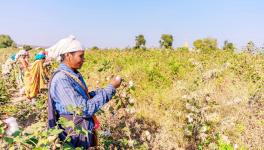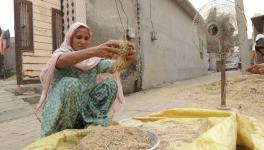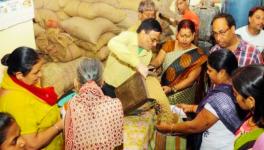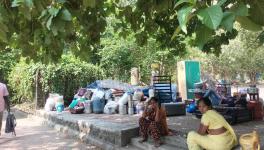COVID-19 in Rural India-XXIX: Impact of Lockdown in Seloo Taluka, Wardha
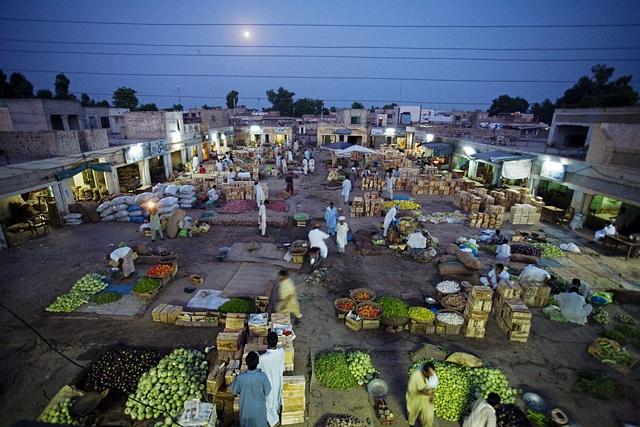
Representational image. | Image Courtesy: Wikipedia
This is the 29th report in a series that provides glimpses into the impact of COVID-19-related policies on life in rural India. The series, commissioned by the Society for Social and Economic Research, comprises reports by various scholars who have been conducting village studies in different parts of India. This report examines the immediate impact of the lockdown on farmers, agricultural labourers, and non-farm workers in Seloo taluka. Information for the report was gathered via telephonic interviews conducted with seven respondents in three villages.
Seloo is a taluka in the Wardha subdivision of Wardha district in Maharashtra. It is in the Vidarbha region and is located 17 km east of the district headquarters, Wardha. Agriculture is the primary source of income for most inhabitants.
An account from Kanhapur village
Kanhapur village in Seloo taluka has a population of about 1200 (Census 2011). Interviews were conducted with two agricultural labourers (Vinod Date and Jyotirao Shinde on April 15, 2020) and a female farmer (Savita Jeevanrao Velle on April 9, 2020).
According to Vinod, around 150 people in the village are labourers, mostly agricultural labourers. Most of them had been engaged in harvesting but had to return to the village when the lockdown was announced—all of them have lost their jobs.
Both Vinod and Jyotiaro reported facing financial difficulties. Vinod stated that he used to earn around Rs 300 per day, most of which went towards feeding his family, including purchasing vegetables and milk. Since the lockdown has begun, the family eats only rice and a very few vegetables. Vinod is actively looking for work, but although there is a shortage of labour, he has been unable to find employment during the lockdown. Jyotirao Shinde is also facing similar issues; both men are concerned about the welfare of their families if they do not find work soon.
According to Vinod, the labourers are entitled to a quantity of rice from the ration shop, but other items like wheat, dal and sugar are not available. According to Jyotirao, the ration shop keeper says that their stocks of these items are exhausted and they have not received new supplies. The labourers are also purchasing some items like milk within the village on credit if they do not have ready cash. However, other essentials like oil and spices are inaccessible as the village shop is closed.
Savita Jeevanrao Yelle owns four acres of land and carries out organic farming on it. She cultivates cotton, soybean, pigeon pea, vegetables, papaya and chickpea. According to Savita, customers and traders used to come to her farm to buy her produce directly from her. But this has been impossible under the lockdown. Savita has had no choice but to take her produce to Wardha city and sell directly to the customers. Along with some other farmers, she began a door to door vegetable delivery service in Wardha; owing to the good relationship between the farmers and their customers, many customers have now doubled the quantity of vegetables they buy. However, the farmers are facing a shortage of labour as not many wage workers are willing to work under the lockdown’s restrictions. Farmers are also unable to pay the standard wage they used to pay workers, as they have been unable to sell all their produce. According to Savita, farmers will either have to stop harvesting the produce or reduce the wages they pay, since paying the earlier wage rate is not possible.
Further, crops like cotton, soybean, tur cannot be sold directly to customers as they require some degree of processing. Farmers like Savita are finding it difficult to store unsold produce, as they do not have access to dedicated storage facilities. Savita also added that the milk co-operative in the village is still functioning, but the prices offered by the cooperative have plummeted from Rs 30 per litre to Rs 20-22 per litre.
An account from Godapur village
Godapur village, too, is situated in Seloo taluka. The village is around five km from the main market of Seloo taluka. Interviews were conducted with a small tea stall owner (Nathu Nahare) and a farmer (Pramod Mude) on April 15, 2020.
Nathu owns a small tea stall near the village and used to earn around Rs 300 to 400 per day from selling tea and snacks. Most of his customers were transport drivers and agriculture labourers. After the lockdown began, Nathu had to close his stall and began to source vegetables from the nearby market to sell them in the village. Now, Nathu earns Rs 150 to 200 per day (after deducting the cost of petrol)—this is about half of what he used to earn by selling tea. According to Nathu, his family is now unable to afford milk and other items like vegetables, spices and oil. Although he is entitled to get wheat and sugar along with rice as ration, these items are not available in the ration shop right now. Nathu’s family survives on the rice distributed by the government (which is not enough in any case) and any unsold vegetables that remain at the end of the day. There has been no assistance forthcoming from government staff, NGOs or village leaders.
Also read: COVID-19 in Rural India- XVIII: Impact on the Rural Workforce in Bihar’s Bharri
Pramod Mude, a farmer from the same village, cultivates cotton and papaya and owns six goats. Due to the unavailability of seed and fertilisers, Pramod is finding it difficult to care for crops. His only source of income at present comes from selling papayas, which he transports on his bike. After deducting the cost of petrol and other expenses, his income is abysmally low. Pramod confirmed that nothing but rice is available at the ration shop.
According to both Pramod and Nathu, no MGNREGA work is available in the village.
An account from Salai (Pevath) village
Salai (P) village of the Seloo taluka is around 15 km from the main market of Seloo taluka. Interviews were conducted with two farmers (Suhas Balwant Lakhe and Vishwanath Suparao Kamble) on April 15, 2020.
Suhas owns 13 acres of land and cultivates cotton, soybean, pigeon pea, chickpea, and wheat. At present, Suhas has harvested some of his crops, but many crops remain standing in the field. Since the lockdown began, Suhas has not been able to sell his produce at the nearest market, around 18 km away. According to him, he has the produce to sell and there are willing buyers, but he cannot sell due to a lack of transportation and restrictions in the market. The market is operational for a very limited time each day, and Suhas has no means of transporting his produce there. He could pay around Rs 1,000 to hire a vehicle, but this is not feasible. Due to the decline in farm income, Suhas remarked that his family’s food consumption has gone down; he also stated that rice is the only commodity that is easily available, as everything else is out of stock. Suhas also remarked that cultivation is affected by the difficulty in hiring labour in these straitened circumstances. He said he was planning to reduce the acreage allocation of crops for the next season. Suhas expressed dissatisfaction at the lack of support from both the government and NGOs in helping farmers take their produce to market.
Vishwanath Suparao Kamble owns seven acres of land on which he cultivates cotton, wheat, chana and vegetables. He had sold 50% of his produce from rabi crops like chana and wheat before the lockdown began but he has decided not to sell his remaining produce as he is not able to get good prices for it. During the summer season, Vishwanath cultivates vegetables, but he has been unable to plant as many as he normally would because the seeds are unavailable. At present, Vishwanth has stocks of apple gourd and okra, but he has been unable to sell these. According to him, he needs a licence from the authorities in order to be able to sell his vegetables at the market. He had applied for licence last week, but has thus far not obtained it.
In the interim, Vishwanath transports as much produce as he can load onto his bike and sells it at the market. Since the lockdown began, the market only functions till noon; this means that many farmers converge at the market at the same time, leading to oversupply and low prices. Vishwanath suggested that the market could be kept open for a longer period each day, with certain restrictions, to allow farmers to get good prices. Vishwanath also said that he would now stop cultivating vegetables and would wait until the kharif season to start cultivating cash crops. He also added that many of the farmers have decided to do this, and remarked that this would lead to a shortage of vegetables in two or three months’ time. Vishwanath also reported that essential items like sugar, spices and milk are very difficult to access since the provision stores are closed.
Among the surveyed villages, a common issue reported was the limited availability of essential items, and most respondents indicated that the shortage of food is a major problem. Although the government had promised ration of rice, wheat and sugar, rice is the only item available thus far. There is an acute shortage of other essential items like dal, spices, sugar and oil.
Farmers have harvested quantities of agricultural produce that they are unable to transport to markets. Even those who are bringing limited quantities to the market on their personal two-wheelers are unable to get reasonable prices due to the market’s limited hours of operation.
There is a growing consensus among small farmers regarding halting the cultivation of vegetables for various reasons, including perishability, the non-availability of seeds and the lack of transport. This may lead to a shortage of vegetables and high food inflation in the next few months.
The author is a research associate with the Centre for Management in Agriculture, Indian Institute of Management, Ahmedabad.
Also read: COVID-19 In Rural India-XXII: Impact of Lockdown on Shepherd Community in Tamil Nadu
Get the latest reports & analysis with people's perspective on Protests, movements & deep analytical videos, discussions of the current affairs in your Telegram app. Subscribe to NewsClick's Telegram channel & get Real-Time updates on stories, as they get published on our website.










